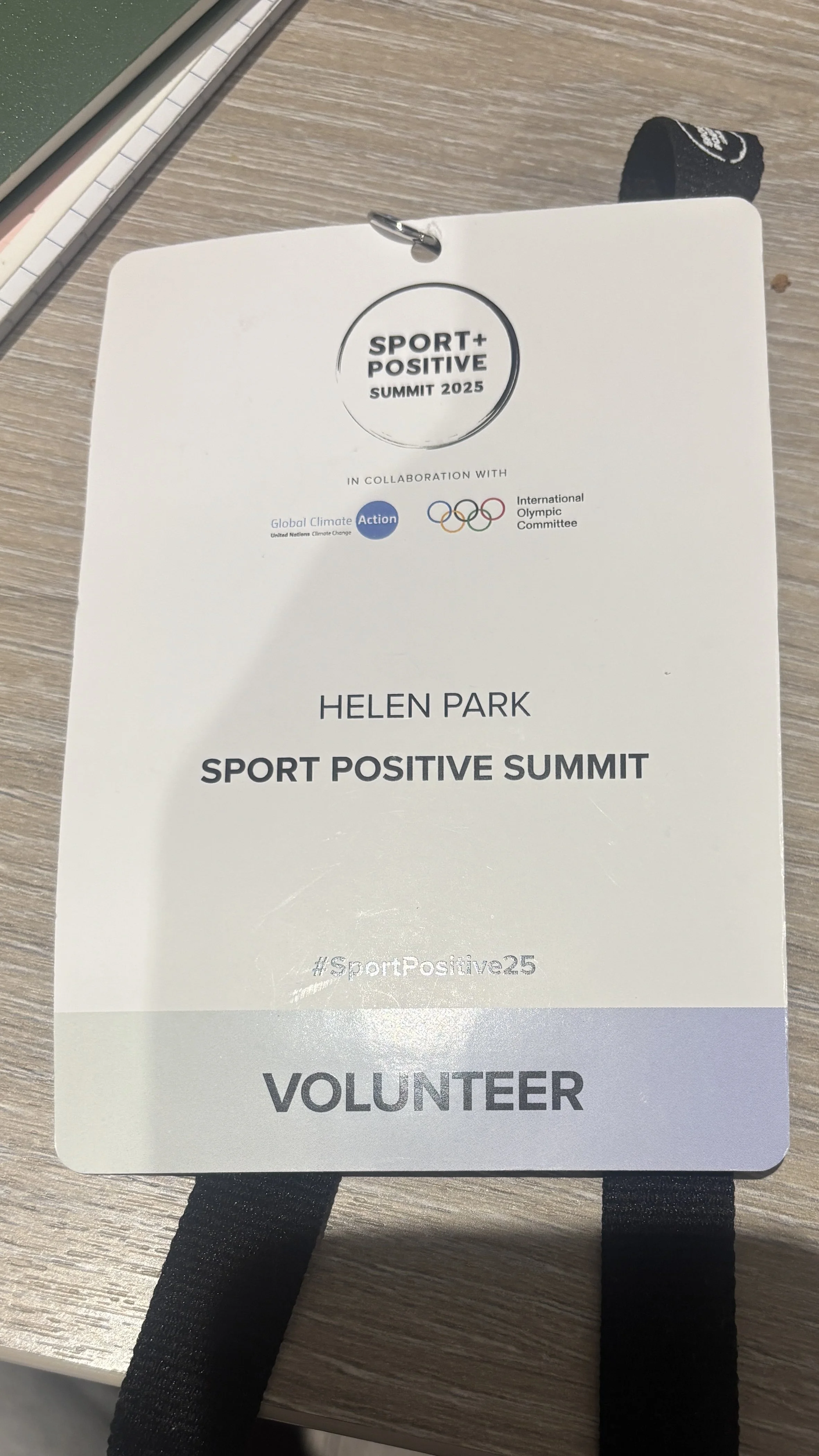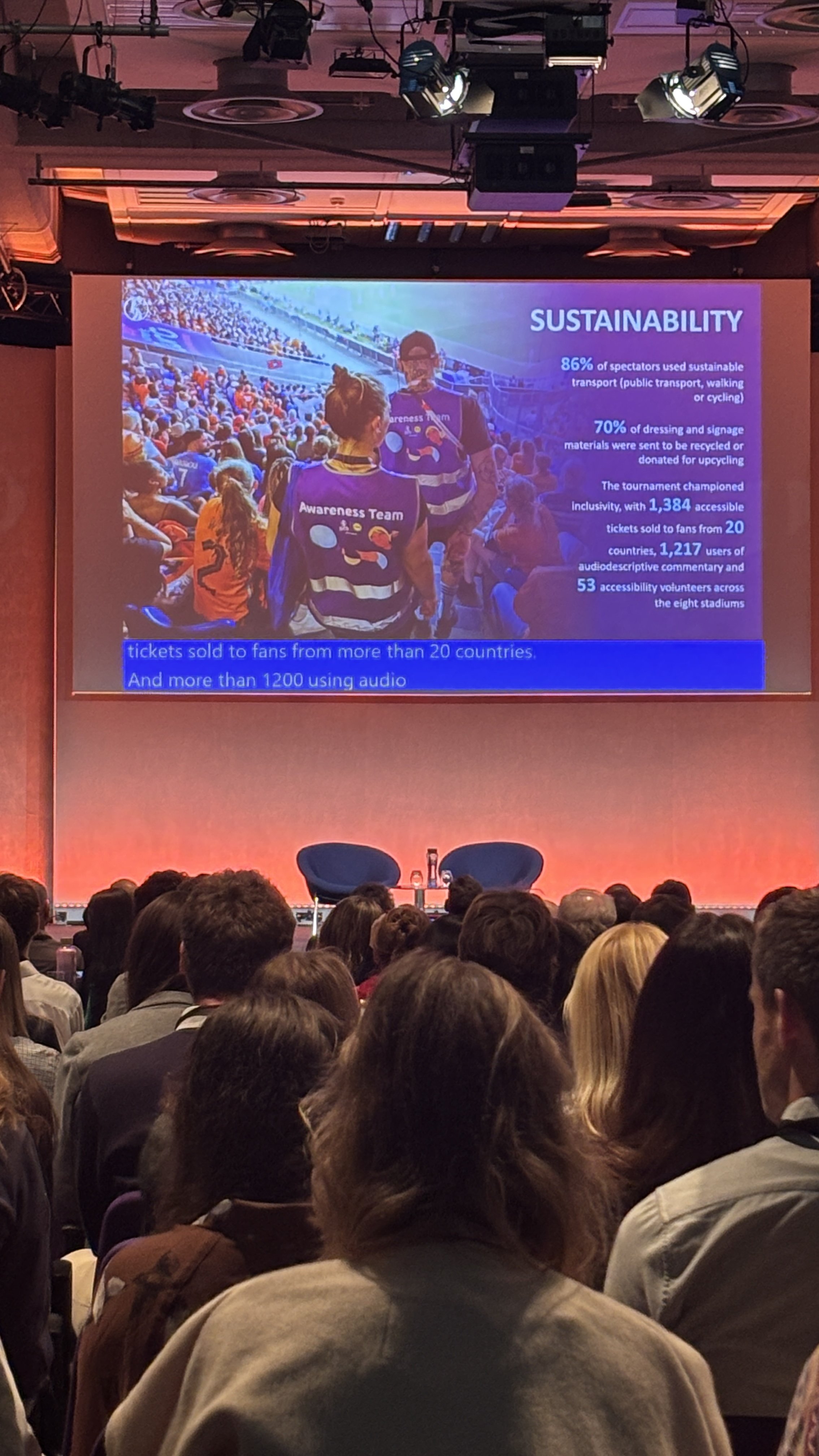Running Into Sports Sustainability: My Experience at the Sports Positive Summit
By Helen Park (11/16/25) — London, UK
Finding My Interest in Sports Sustainability
In October, I had the opportunity to volunteer at the Sports Positive Summit in London—a gathering of organizations, athletes, policymakers, and sustainability practitioners all focused on accelerating climate action through sport. Let’s rewind a little bit to how I first gained an interest in the field of sports sustainability. In Spring 2024, I attended a NYU Center for Sustainable Business global book launch of Dr. Madeline Orr’s Warming Up: How Climate Change is Changing Sport, where I first learned about the intersection between sports and sustainability. As a former junior golfer, I’ve noticed the impacts of climate change on golf; for example, tournaments’ starting times were earlier due to extreme heat later in the day. To dig deeper into this field, I connected with Lew Blaustein, a NYU alum and a panelist at the book launch, who recommended I volunteer at the Sports Positive Summit to learn more. In a full-circle moment, I saw Dr. Orr and Lew at the Sports Positive Summit and caught up on their latest projects.
Volunteering
Caption: Volunteer badge
Before the event started, the 10+ volunteers gathered, introduced ourselves, and were delegated different tasks based on the needs of the operations team. During the Summit, I supported the event operations team across both the main auditorium and breakout rooms. My role included assisting with ushering participants to different breakout rooms and answering any questions participants had. From standing near entrances monitoring flow, to answering attendee questions, to observing panel dynamics up close, I gained a behind-the-scenes perspective on how a multi-day international conference is executed. Being part of the volunteer team allowed me to engage directly with practitioners, listen in on discussions, and learn how sustainability conversations unfold at both strategic and operational levels.
After conversing with my fellow volunteers about how we learned about the event and what led us to volunteer, we had one thing in common: a desire to learn and meet others working towards a sustainable future in sport. One volunteer, a former athlete, came all the way from the Netherlands to transition from the food industry to the sports industry. Another volunteer, a member of Team Great Britain sailing, was also planning to qualify for the next Olympics, but, due to a lack of funding, she wasn’t able to pursue it. I also got to meet David Aisa Miller, whom I interviewed for my last Blog Post, in person! It’s so cool to see people from a range of backgrounds coming together to volunteer and learn.
My Takeaway from the Keynote Address
Caption: Statistics from the 2025 UEFA Women’s Euros
One of the most impactful sessions for me was the keynote conversation featuring Doris Keller, Tournament Director of the 2025 UEFA Women’s Euros. Her perspective emphasized that sustainability is not an add-on to major sporting events—it must be embedded from the very beginning, shaping decisions about transportation, venue operations, fan engagement, and accessibility. She shared that the tournament is planning for sustainable mobility, aiming to make walking, cycling, and public transport the most intuitive options for fans. What stood out even more was her focus on inclusivity as a core pillar of sustainability. Keller’s message reinforced that major sporting events can be catalysts for cultural change when they prioritize both environmental responsibility and equitable fan experience. My personal reflection: Women’s sports can be a driving force for sustainable change.
Inside the Room: Learning from Leaders and Practitioners
Caption: Panel on “Passion and Purpose: Activating Fan Engagement through Sports’ Biggest Moments”
Being seated near the back of breakout rooms, surrounded by professionals, I listened to speakers discuss not only the progress being made but the honest barriers that still exist. Discussions touched on:
The challenge of fossil fuel capital in sports and sustainability
Effective ways to communicate sustainability to fans and alter their behavior
The need to make sustainability decisions measurable, visible, and understandable to the public.
There was a strong acknowledgement that sustainability strategies cannot rely on vague language or future goals—they must be structural, immediate, and accountable. Hearing this affirmed that the field is moving beyond awareness-building into implementation and responsibility.
Observing Collaboration in Real Time
Throughout the Summit, I spent time in breakout rooms—greeting speakers, coordinating seating, and supporting room transitions. This vantage point let me observe something important: sustainability progress is happening not only on stage but also in small, collaborative conversations between people who may not have previously worked together.




